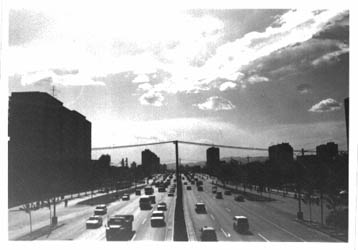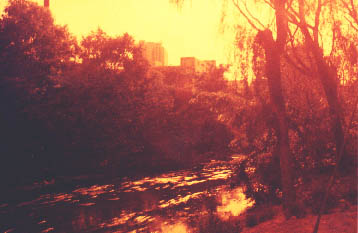Hacking
the Chinese city
Hacking the Chinese city
Spending those long days in the suburban landscape of Beijing
made me want to learn more about the alien buildings and the people that
inhabited the module-based highrises that rose like oil-stained grass
in the unmowed lawn that made out the capital of China.

The serious jet-lag from Europe made me wake up at 4 am the first weeks.
I could not go to sleep again in the hot fetid air. Instead of sweating
in bed I used the morning hours for long walks in the city-space that
surrounded the worn-down campus where I lived. Even though the area was
definitely urban, there were vast areas of farmland and swamps that cut
into the city. Often this was were the humming power lines went, gradually
even these secluded areas were giving way to low slum buildings, shantytowns
built on swampy ground.
I also took long walks during the not-so-hot afternoon, mostly out of
boredom, but also out of curiosity. The concept of "a nice area", which
makes us Westerners clean and repair the facades of the buildings neighbouring
a newly built mall (or other monumental architecture) was clearly not
en vogue, only the new buildings themselves were clean and fresh.
The buildings next to the new shopping-center Modern Plaza, dated from
the time of the Cultural Revolution, were as dirty and shitty as ever.
Some parts of Beijing, known as "hutongs", look like they did a hundred
yeards ago. Once, most of the people in the capital lived in hutongs,
and it's still the most preferred type of accomodation, not that everyone
can afford to live in one of them. These days only the moderately rich
can afford a house in a hutong. A hutong is what we in the West would
call a block of chain houses. A hutong most often takes up a whole city
block (it IS a whole city block in the mindscape of the Beijing urbanite),
and all of the buildings are built together, maybe to save the precious
brickstones that they are made of, or to make a collective statement of
about society.
The one-story hutongs are penetrated by a maze of narrow gangways and
passways that constitute both sewer and route of transportation. Usually
a whole hutong has only one toilet, a building that everyone shares, a
place for gossip - the de facto social center of the block (where
one can loudly socialize in a squatting position over the sewer trench).
There are hutongs and hutongs however; there is a famous shopping hutong
and also a pharmacy houtong as well as "finer" hutongs. The number of
hutongs is receding though, in the 60's there were as much as 3000 hutongs,
now there are only a few hundred left.
The old has to be levelled with the ground, in order to make way for
the new. No Chinese would ever show any discontent with this, progress
is still a good word - and who can blame them? Who would not like running
water, sanitary conditions, water closets, power lines that can support
more than one 40W bulb per household, telephones, kitchen machinery...
We often fret about the loss of our "fine old" workers' quarters here
in the West, but who would actually want to live in them?
What comes after is not always better though, badly built highrises
come by the hundred where the hutongs once stood. The most common building
is the 5-6 storey apartment complex, built from the same pre-cast concrete
wallframes as the higher houses. Close to the big boulevards are the malls,
a relatively new feature in the Chinese city, sporting masses of luxury
items that were almost utattainable for most Chinese a few years ago,
and, in a way, still are...

Chinese shops all look the same, at least if they are on the same street,
most often a street can have 3-4 shops (of the same type) that even carry
the exact same items. Sometimes there are whole boulevards that have stretches
of 10 + similar shops. How do they survive? Why don't they seek a fresh
location? I guess that the city was planned that way, the "let's
put some hardware stores here" type of thing. Anyway, these stretches
of shops make great surreal attractions.
Another striking aspect of Chinese city life is that bicycles operate
on left-side traffic rules and cars on right-side rules. There are lots
of small eateries but these are of little interest to the urban explorer.
Beijing used to sport a large amount of lamb-kebab making Iranians, for
less than 2 cents a stick you could snack away as much as you wanted.
The government, however, decided that the smoke that arose from the snack
stalls was a health-hazard, so they banned it.
As the kebabs only were available during the evening, I had to look
for other types of food on my morning scavenging rounds. I used to start
my day taking the 20 minute walk to find the earliest out hotcake vendor
on a remote stretch of ring road 4. The hotcake was wrapped around fried
bread and a modest fistful of crappy vegetables, but for 20 cents it was
an O.K. meal. The seasoned snack-tracker knows that the best food is on
the street, fermented in the sun for God-knows-how-many-days and fried
at a killer temperature.
I never felt threatened during my treks, mostly because I knew that
there are few robberies of foreigners in Beijing. I was also careful not
to carry too much cash or to have any valuables except for my camera,
the Pentax p-30 with the broken trigger that I got for free from a friend
back at home. Using a remote trigger-wire I was able to take photos, mostly
of different types of streets, shopsigns and weird-looking buildings.

Unwashed shitty concrete still make me long for those walks. I like the
feeling of doing something almost pointless just for the hell of it. At
least walking is better than sitting on one's ass for a whole day doing
nothing, perhaps, in the act of walking we can find temporary relief from
boredom. Maybe it's not that easy, we're not fleeing from boredom, but
seeking out happiness, which according to an age old Powerbase motto "can
be bought".
One can also "cheat" oneself to happiness, i.e. not spend money for
it, thus evading the strict corporate structure of thought that equals
happiness with amount spent currency. Happiness is perhaps the Realkapital
of Powerbase put into action, walking and pumpin' those endorphins...
by Joel
Westerberg
|



